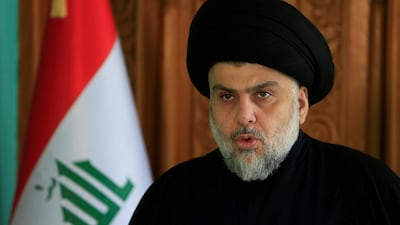Negotiations were under way between Iraqi politicians on Wednesday after the country’s first election since the fall of ISIS delivered a shock third place result for Haider Al Abadi, the incumbent prime minister long backed by the US.
Preliminary results showed that populist cleric Moqtada Al Sadr, an Iraqi nationalist who has distanced himself from neighbouring states, was set to win the most seats in parliament. His "Marching Towards Reform" alliance with Iraq's communists tapped into popular anger over corruption and foreign meddling.
The Shiite cleric has ruled himself out of the premiership. Instead, he is looking to be the kingmaker who can cobble together a technocratic government from a dozen parties.
But with his alliance falling short of a majority, lengthy wrangling in Baghdad is expected as rival parties bid to forge a governing coalition.
The final nationwide results should be announced in the next two days, according to Riyadh Al Badran, the Iraqi electoral commission chief.
The moves to shore up a coalition government became an international affair on Tuesday, as Brett McGurk, the White House special representative in the fight against ISIS, arrived in Baghdad for talks to broker a deal favourable to Washington. Also reported to be in the Iraqi capital was Qasem Soleimani, the shadowy spy chief who leads the foreign wing of the Islamic Revolutionary Guards Corps (IRGC) known as the Quds Forces.
The visits are a mark of the importance both America and Iran placed on the outcome of the vote.
The US has supported Mr Al Abadi's government for more than three years, helping him and Iraq's armed forces defeat ISIS after the militant group seized control of swathes of northern and western Iraqi territory in 2014. Iran sponsors numerous Shiite militias who make up the majority of the government-aligned Popular Mobilisation Forces (PMF).
Mr Al Sadr has long railed against Iranian interference in the country, and allies of Tehran rounded on the surprise vote winner.
______________
Iraq elections:
Analysis: Rise of Moqtada Al Sadr upsets US calculations in Iraq
Iraqi PM ready to 'co-operate' after election upset
Comment: Whatever shape of post-election alliances emerge, the new government faces challenges
______________
Mr Soleimani arrived in Iraq on Saturday, the day of the parliamentary elections, to try to broker a coalition among Mr Al Sadr's Shiite rivals.
“Qasem Soleimani in Baghdad to try to make sure that the National Alliance, which holds all the Islamist Shiite groups together, is able to maintain itself,” Renad Mansour, senior research fellow at London’s Chatham House, told The National.
Mr Al Sadr has been clear that he is unwilling to compromise with Iran by forming a coalition with its main allies: Hadi Al Amiri, leader of the Shiite Badr paramilitary group and Fatah, and former prime minister Nouri Al Maliki, who is leading the State of Law bloc and presided over the rise of ISIS.
“If Al Sadr’s group is excluded, that would lead to instability and the protest movement would emerge even stronger,” Mr Mansour continued.
Formal talks are expected to take place after of the poll’s final results. The challenge for both Mr Al Sadr and his rivals will now be to demonstrate and deliver progress after voters appeared to rail against the established Iraqi political establishment.
Mr Al Sadr’s advance in the elections is a “warning shot for parties as they face the December 2018 local elections – they know now that voters want something different and exciting,” said Michael Knights, a fellow at the Washington Institute for Near East Policy.
Several incidents on Wednesday highlighted the country’s precarious security situation and fractured political atmosphere. A suicide bomber killed eight people and injured 30 more when he blew himself up in the Taji district north of Baghdad. No group claimed responsibility for the blast but ISIS has taken responsibility for attacks in and around Baghdad in recent years.
In Kirkuk, electoral commission head Riyadh Al Badran reported that gunmen had besieged several polling stations, disrupting the vote count in the northern city at the heart of the long-running dispute with Iraqi Kurds. However, Kirkuk governor’s office said there had been no hostage-taking and further reports stated the gathering was only a sit-in by Arab and Turkmen in an area where the Patriotic Union of Kurdistan (PUK) won the largest share of the vote.


